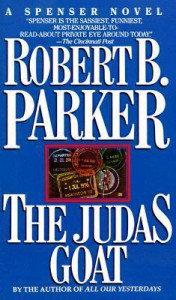
“You’re quite a lethal chap, aren’t you?”

Spenser goes globe-trotting. It’s a jammy gig too; money no object, first class air travel, the best hotels….except he’s got to track down nine members of the terrorist group “Liberty” whose collateral bomb damage included the family of money-bags Hugh Dixon. It also means Spenser has to spend time away from his beloved Susan Silverman. Not an easy task.
Spenser heads to my old stamping ground in London, the environs of Goodge Street, the Post Office Tower, Mayfair and the Strand and rather sweetly chivvies things along by placing an advertisement in The Times. Well, it is 1978. The ad yields a note suggesting a rendezvous in Regents Park, a stakeout of the young woman who delivered it and a visit from two Liberty knuckle-draggers which turns out to be bad news for them. Understandably the police aren’t thrilled by gunplay in a central London five star hotel but they nevertheless let Spencer be Spencer so as to a) be rid of these yahoos and b) not to halt the novel in its tracks. Liberty is a rather amateurish, if violent, little collection of thugs with a racist bee in their bonnet about maintaining white rule in Africa and it’s exactly the sort of thing that doesn’t sit well with Spencer – a liberal who happens to carry a gun. He really didn’t like people raining on Rachel Wallace’s parade, either. Spenser does what the London police can’t do, breaking and entering the flat of the mysterious woman who delivered the note – one Katherine Caldwell – and there he finds a whole lot of crazy: guns, ammo, grenades and Mein Kampf.
Spenser breaks cover to once again mix things up and triggers Katherine’s flight to...Copenhagen. After another bullet fest and an encounter with a Liberty apparatchik Spenser summons friend Hawk for backup and together they head to Amsterdam. Sick of this pursuit Liberty sends the bodies of the final two bombers to Spenser along with Katherine tied to a bed mentioning they hope that’s an end to proceedings. Think again, says Spenser, after Katherine casually mentions her Liberty stooge has tickets for the 1976 Summer Olympics in Montreal. Dixon okays the mission-creep and Spenser refuels with a half-time visit to Susan who offers an analysis of the sexed-up Katherine’s psychology…among other things. Spenser and Hawk ultimately uncover a post-Munich plot to bump off medal-winners and, despite both being jolly fit types – no bottles being hit other than recreationally here – they find themselves almost physically outclassed by the ringleader of Liberty who happens to be built like Giant Haystacks.
“The Judas Goat” is my third Spenser novel and now I’ve belatedly twigged there are continuing characters and a developing relationship with Susan I’m regretting reading them out of order. Like “The Godwulf Manuscript” and “Looking For Rachel Wallace” this 150-page, one or two-dayer passes the time most agreeably. Spenser is good company, offering bon mots, movie references and a strong moral compass (he remains sexually true to Susan throughout despite Katherine trying a number on both him and Hawk). He’s handed a credible task with high stakes, we watch him and Hawk be good guys through a lot of violent and sexual shenanigans and he then returns to Susan to remind himself – and the reader – that actually there are good things in the world. Parker basically offers solace and reading this sort of thing after, say, a 500-page James Ellroy tour of hell – or watching the news – comes as welcome relief. Some reviewers dislike the mushy stuff in the Spenser novels but this reader finds it to be a perfectly fine splash of sincere humanity after all the broken men you usually find going doolally over the wrong broads in these novels. Spenser is a genuine good guy and he has a passionate connection to life: “It’s like I need to love you to come back whole from where I sometimes go” he tells Susan.
“The Judas Goat” isn’t cutting edge, experimental or particularly original – Hugh Dixon is an obvious General Sternwood avatar, with a sprinkle of believable grief – it’s just a very congenial ride. Parker is an artist you want to be around and the movie references, the knowing racial banter with Hawk and the refusal to accept he got shot in the arse rather than in the upper thigh make Spencer the sort of private investigator you’d actually want to hire if life took a turn for the worse. Yes, he walks some mean streets for sure but he doesn’t let you forget that in the end there is rolling countryside out there if you know where to look. “Here’s looking at you, kid”




